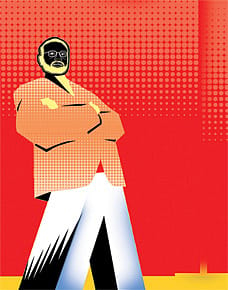Anyone but the One

The One is Modi now, and at this moment in Indian politics, as the poet would have said, the performer and the performance have become one.
Anyone-but-Modi is just another refrain that brings out the extent to which the singularity of this contest has gone. The mantra, uttered by those who have a pathological aversion to the man who could be the next Prime Minister and by those within his own political family whose ambition is as big as his but is not matched by their performance or popularity, may no longer be as audible as it was earlier. It is, nevertheless, a measure of how one man's passion can galvanise as well as divide. It is also a manifestation of one trait of Indian politics that won't be swept away by any wave: the sheer ease with which it abandons the mandate and settles on the least deserving, the darkest horse. Anyone-but-Modi, however feeble and unrealistic it may turn out in the end, is a response from the legion of the lost towards the inevitability of this election: No-one-but-Modi.
There were, of course, such moments before, when the choice of India was between the One and nothing. Most memorably, the One was Indira Gandhi once. There was no agenda more national than Mrs G, and there was no candidate who was an alternative to her. That was candidate as mother redeemer, larger than the party, and it was her emotional covenant with India that looked unbreakable then. It would be broken, and nothing would be as ruthless as the end of a relationship built on sentimentalism and adoration. But while it lasted, it was a rare relationship between the leader and the people that allowed no space for third parties. It was no-one- but-Indira.
2026 Forecast
09 Jan 2026 - Vol 04 | Issue 53
What to read and watch this year
The One is Modi now, and at this moment in Indian politics, as the poet would have said, the performer and the performance have become one. The performer, without a supporting cast and a worthy antagonist, is different from the One before. Biography is not his destiny. His evolutionary story as a politician is not part of a larger family saga with the Independence movement as a backdrop. Power and privilege, and growing up in history—that is not Modi's backstory. He was not the Chosen One, and he won't be. He is the Inevitable One. He came from outside the Establishment, from the ordinariness of India an Arvind Kejriwal has sloganised but never comprehended. Within his own party, he was not the Choice until he made himself inevitable—and indispensable. The outsider whose campaign, which began more than a decade ago from Gujarat, was about defying hierarchies within his own party and outside it. The velocity of the commoner's ascent, like a force of nature, tells us that he is here to stay, ahead of the rest, for better or worse. This election is about him, as the others he has starred in before.
That is why India-is-not-Gujarat is a redundant line. For those who have watched Modi on the stump in the three elections he fought and won in Gujarat, it was obvious: He never fought a local election, and he never fought an election in which he was not the theme—the only national theme. He spoke India—its possibilities, its enemies, its diminished esteem— and exaggerated it for effect in successive Assembly elections, all referendums on his leadership. Today, the Modi campaign is a bigger version of it, and it is as presidential as the earlier three. For this man, there was no one else to build his mythology and market it; he had to do it all by himself. Rarely have such projects in political mythology become a national show of this magnitude. It is one man's ambition—and the lone struggle for its realisation—as a national passion play.
And you just can't alter the script by inserting this ridiculous line, anyone-but-Modi, at this stage, the denouement. Its ridiculousness is amplified by what is unsaid but implied. Who's Anyone? Is it the wise old man of BJP, still floating in the fantasy of a compromise, a karmic reward for walking the longest distance for the cause of the Indian Right? Or, is it the warhorse from the heartland, the party boss and an active apostle of Moditva, waiting for something to go wrong after the victory, a mathematical error maybe? Or is it one of those leaders from the provinces, permanent bargainers in the post-election black markets of Indian politics? Any of these could have been a possible scenario in another time, in another India. It could have been possible if Modi was merely a prime ministerial candidate of BJP, as LK Advani was five years ago. Today the truth is: BJP just happens to be the party of Modi. It is not that a cult of the Maximum Leader is in the making, and that his attitude towards power is more important than the apparatus of the party. We are not there yet. We are, nevertheless, closer than ever before to an upheaval: one tenacious man has made India his argument, and he lets no one steal it—or alter it. Anyone may still try.
